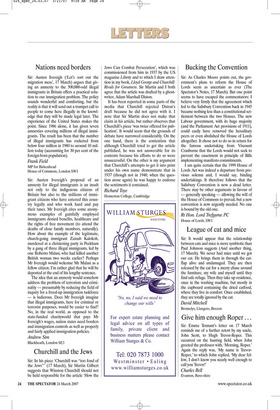Bucking the Convention
Sir: As Charles Moore points out, the government’s plans to reform the House of Lords seem as uncertain as ever (The Spectator’s Notes, 17 March). But one point seems to have escaped the commentators: I believe very firmly that the agreement which led to the Salisbury Convention back in 1945 became nothing less than a constitutional settlement between the two Houses. The new Labour government, with its huge majority (and the Parliament Act provisions of 1911), could easily have removed the hereditary peers or even abolished the House of Lords altogether. It chose not to do so in return for the famous undertaking from Viscount Cranborne that the Lords would not seek to prevent the enactment in principle of Bills implementing manifesto commitments.
I am quite certain that the 1999 House of Lords Act was indeed a departure from previous solemn and, I would say, binding undertakings. It therefore follows that the Salisbury Convention is now a dead letter. There may be other arguments in favour of — generally speaking — allowing the will of the House of Commons to prevail, but a new convention is now urgently needed. No one is bound by the old one.
Rt Hon. Lord Trefgarne PC House of Lords, SW1


















































































 Previous page
Previous page